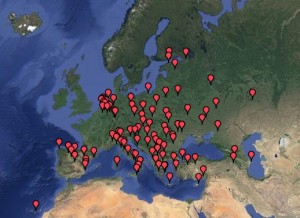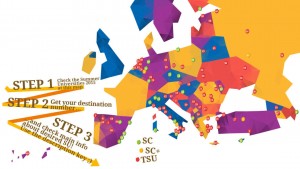Just like we did for the last Agorae, for Autumn Agora Kyïv again we want to provide you with a short and easy summary of the proposals submitted for the Agora. In this second round, we will be explaining you three proposals that focus on improving our biggest project to date: the Summer University project. These proposals are called ‘Improving SU (I)’, ‘improving SU (II)’ and ‘SC+ criteria reform’.
The Summer University project was established in 1988 and has been involving more than 2000 young people every summer ever since. Students from all over Europe spend on average two weeks together in different places, learning new cultures and languages and sharing great experiences. Since its establishment, the Summer University project has been one of the most successful projects and it has been shown how much AEGEEans cares about it. The Summer University Coordination Team is the body that runs the project, of which the members are elected during the Autumn Agora.

The first proposal is called ‘Improving SU (I)’ and was proposed by Ander Guerrero Ruiz (Financial Director of AEGEE-Europe) on behalf of the Comité Directeur. This proposal aims to ensure a better use of the finances of the SUCT, which are currently administrated by one of the four members who composes the team. Right now, the SUCT is free to use their budget in a way they find most suitable for the project and the team itself, but the first change the proposal wants to make is that they will need the approval of the Financial Director, who will give advice on drafting the budget. Also, a new role will be added to the ones already existing (Project Manager, IT responsible, PR responsible, Treasurer and Publication Responsible): the Fundraiser. Another thing that will be added is that during the Autumn Agora, where the SUCT will present their report, also a report about expenses and trips must be presented. Moreover, if a member of SUCT is attending the Spring Agora, an interim report, a presentation of the budget and an update of the status of the SU project has to be presented as well. Lastly, big expenses need to be announced one month prior to the Financial Director who can reject them on a mutual decision with Comité Directeur.
Here you can read the full proposal.
‘Improving SU (II)’ is also proposed by Ander Guerrero Ruiz (Financial Director of AEGEE-Europe) on behalf of the Comité Directeur. It aims to raise the daily fee for the SU Course/SU Course+. Currently, Summer Universites are divided in three categories: SU Course, SU Course+ and Travel Summer Universities and the fees are divided in two categories: 12 euros for SU Course and 14 euros for SU Course+ and TSUs. According to the proposer, in fact, organising a SC is not cheaper than organising a SC+ or TSU and maybe this discourages small locals to organise a Summer University. This may be the reason why the amount of locals organising a SU has been rapidly decreasing in the last few years. By unifying the costs of the fee, we can see if this decrease is because of financial problems of the locals or there are other reasons to be detected.
Here you can read the full proposal.
 The last one is ‘SC+ criteria reform’, which is proposed by Matthijs Overhaal and Jorge Miguel Vielva on behalf of the AEGEE-Academy. This proposal aims to change the approach towards the SU Course +. Currently SC+ has a duration between 14 and 28 nights with at least 20 hours of tuition per week and a minimum of 15 participants. The proposers believe that the potential of this type of Summer University is not exploited to the fullest, so they would like to decrease the minimum of nights to 11 and have at least 36 hours of tuition in total. One of the requirement to organise a SC+ is to have the support of the university where the Summer University is taking place and lessons must be thought by professional teachers. The proposer are adding The AEGEE-Academy to the academic support to foster Non-Formal Education with their qualified trainers, which can allow more flexibility and, according to Matthijs and Jorge Miguel, might encourage more locals to decide to organise a SC+.
The last one is ‘SC+ criteria reform’, which is proposed by Matthijs Overhaal and Jorge Miguel Vielva on behalf of the AEGEE-Academy. This proposal aims to change the approach towards the SU Course +. Currently SC+ has a duration between 14 and 28 nights with at least 20 hours of tuition per week and a minimum of 15 participants. The proposers believe that the potential of this type of Summer University is not exploited to the fullest, so they would like to decrease the minimum of nights to 11 and have at least 36 hours of tuition in total. One of the requirement to organise a SC+ is to have the support of the university where the Summer University is taking place and lessons must be thought by professional teachers. The proposer are adding The AEGEE-Academy to the academic support to foster Non-Formal Education with their qualified trainers, which can allow more flexibility and, according to Matthijs and Jorge Miguel, might encourage more locals to decide to organise a SC+.
Here you can read the full proposal.
You can read the CIA here.
Written by Erika Bettin, AEGEE-Verona

